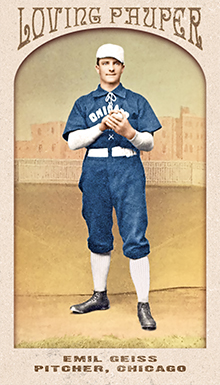
- Series: 1880s: Loving Paupers
- City: Chicago
- Team: White Stockings
- League: National League
Emil Geiss (1865-1911) emigrated from his birthplace, Villmar Germany, to Chicago. The youngster began his experience in professional baseball out in Colorado with the Pueblo Pastimes of the CO State League in 1885. The scanty records for minor league play in those days record Emil started two games, finished them both and went 1-1. There is no data for Geiss’ activities the following year, but one might suppose he did something somewhere to impress the Chicago White Stockings as the National League power thought fit to sign Emil for the ‘87 season. Whatever Cap Anson’s hopes were, they died aborning as Geiss languished with the team. He got shelled in his one start (11 runs, eight earned) and not only left the major leagues, he left his adopted land. Geiss signed the following two seasons with London Ontario Canada’s Tecumsehs of the International Association and stayed for the 1889 campaign when the Tecumsehs joined the International League. In those two years Geiss was 21-21 . But for his sole outing in Chicago, he would have completed his pro tenure with a symmetrical record of 22-22.
- There is no doubt Emil belonged in the pitcher’s box as his hitting gave no indication he could perform anywhere else. He never cracked the .200 mark and was one for 12 with the White Stockings. His three errors in his brief time in the majors suggest it wasn’t just his bat that would be a detriment to longevity at that level
- The reason Geiss had twelve at bats in Chicago is that Anson put him at first base and second base in two other appearances
- Emil’s older brother Bill also saw major league duty, playing two seasons. He debuted with Baltimore in the American Association in 1882 and then joined the Detroit Wolverines of the NL in ‘84
Auction History
Cartophilia
Old Judge Pose: 182-2
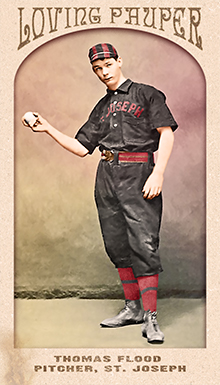
- Series: 1880s: Loving Paupers
- City: St. Joseph
- Team: Clay Eaters
- League: Western Association
Thomas J. Flood (1867-?) never made it to the major leagues, but his Old Judge card series in 1889 placed this young Missouri ballplayer among an elite of his day. He was captured by the photographer in his St. Joseph Clay Eaters uniform cutting a dashing figure as a right-handed pitcher. Indeed, The Sporting News noted that Thomas had been the Houston Babies’ star hurler the prior year, going 11-15 for a struggling franchise. He was again the stalwart of that team in ‘88 when he compiled a miserable record of 2-10, but started the majority of games, completing the entire dozen. Only one of that squad’s pitchers ever had big league experience. That was veteran Doc Landis who was in the final year of his career that had begun with American Association teams in 1882. The Texas Southern League in those days consisted of a mere six clubs, including the San Antonio Missionaries and Dallas Hams. Flood had started out with amateur outfits in his native St. Louis, such as the Prickly Ash and Grand Avenue clubs. The Sporting News mentioned his first professional job was with Springfield, MO in 1887 where he was said to have won every start for the Indians of the Southwestern League. Unfortunately, Flood’s auspicious beginning ended abruptly with the demise of the Springfield franchise. He was picked up by Ft. Smith to finish the season. With the Clay Eaters, Thomas found himself among a staff with better talent. Five of his fellow pitchers would see big league service. He went 9-16 in ‘89, the third-best record on the team.
- Despite missing out on MLB glory, Flood was celebrated by The Sporting News as “the finest pitcher in the Southwestern League.” Not a bad clipping to show the family
Auction History
Cartophilia
Old Judge Pose: 164-4
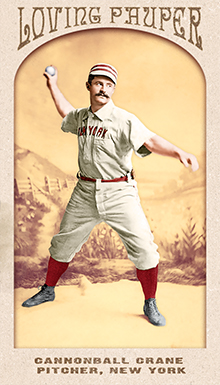
- Series: 1880s: Loving Paupers
- City: New York
- Team: Giants
- League: National League
Edward Nicholas Crane (1862-1896) began in major league ball with the notorious Boston Reds of the Union Association - a hard-drinking crew. It appears that big Ed avoided the bottle that would eventually kill him years later when he joined Al Spalding’s world exhibition tour. That he even made that trip was highly unlikely as Cannonball had labored in anonymity for years until the 1889 “World Series,” where Jim Mutrie played a hunch and decided his Giants could best the Bridegrooms with fastballs. Crane was tapped for five starts, won four and the Series. Cannonball could always throw hard and was famed for a 406’ long-toss, but such post-season heroics were virtually unheard of. The seeds of Ed’s doom had been planted on that tour however, nourished by the vices of Paris. All too soon he would spiral into alcoholism and an early death. While the coroner ruled Crane's death an accidental overdose, rumors persisted that he had taken his own life by drinking acid.
- Ed had one of the great seasons of any pitcher for the Toronto Maple Leafs in ‘87 with 33 wins and an eye-popping .428 BA (when walks counted as hits)
- Other firsts: 1st NY Giant to hurl no-hitter; 1st pitcher with four Ks in an inning
Auction History
Cartophilia
Old Judge Pose: 96-6
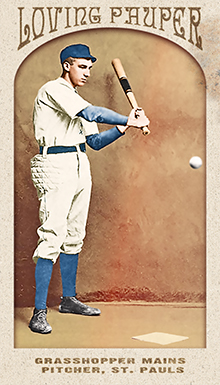
- Series: 1880s: Loving Paupers
- City: St. Paul
- Team: Apostles
- League: Western Association
Willard Eben Mains (1868-1923) had only a few brief appearances in the majors as a pitcher. He was 1-1 with the Chicago White Stockings of the National League in 1888 after starting in pro ball with Portland of the New England League the previous season. He returned to the minors in the Western Association and would go on to a successful career in the lower echelons, winning 318 while losing 179. In 1891 Grasshopper got a little longer opportunity with the American Association's Cincinnati Kelly's Killers and Milwaukee Brewers where he went 12-14. It would be another five years before his last shot in the big time, with Boston's Beaneaters in '96, where he was 3-2.
Mains, also known as Willie, was a product of one of the oldest families in his native Maine. He came out of Windham and would make a name for himself manufacturing bats. He had at least three factories in Sandy Creek, Harrison and Fryeburg, but marketed his product nationally. A Mains Dolley 31” bat circa 1890s recently sold for $400.
- Over his entire 20-year career in professional baseball, Mains played for 17 teams. He stayed in upstate New York for his final decade, closing out his tenure with the Binghamton Bingoes in 1906 after two lengthy tours with the Rome Romans and Syracuse Stars
- Willard inspired his son Jim to pursue careers in both baseball and bats. James R. Mains played first for Harvard in 1942 and got one appearance in the majors, with the Athletics, in August '43 where he lost his only start. Jim established his bat-making operation in Bridgton, Maine
- Perhaps it was his pedigree as a scion of the Down Easters that prompted the Old Judge photographer to record Grasshopper's surname as "Maines" on his St. Paul Apostles card series
Auction History
Cartophilia
Old Judge Pose: 290-2
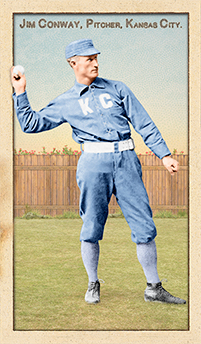
- Series: Beginnings: 1880's
- City: Kansas City
- Team: Blues (WA)
- League: Western Association
James P. Conway (1858-1912) pitched briefly in 1884 and ‘85 for the Brooklyn Atlantics and Philadelphia Athletics of the American Association. He was 3-9 for the Brooklyn and 0-1 for the A’s before returning to the minors, primarily in the Western and Southern leagues. Jim came back up with the Kansas City Blues in 1889 and had a fine season, winning 19 as the ace of a struggling team that finished 7th in the AA. The year before, Jim’s kid brother Pete had won 30 games for the Detroit Wolverines but quickly faded from the game along with Jim who’s arm gave out after that one stellar year. Jim managed to return to the mound after a year’s layoff but went only 8-12 for two minor league clubs in 1891-92.
- It has been speculated that Conway’s demise as a major-league pitcher had more to do with attitude than physical limitations. He was nicknamed “Dark Days” to signify a sour disposition
- Jim was a teammate of Hall-of-Famer Billy Hamilton who stole 111 bases in 1889




